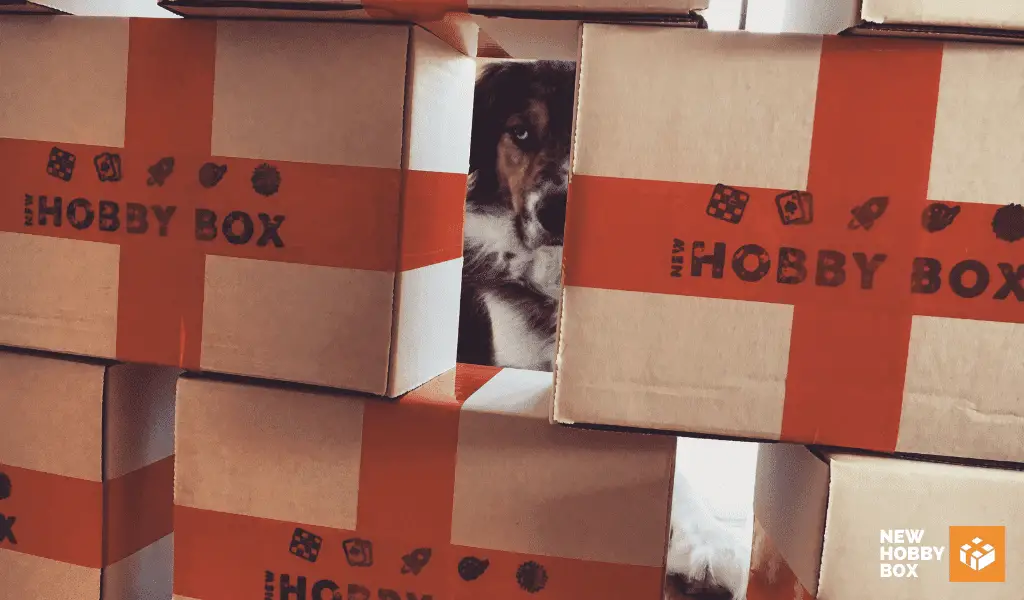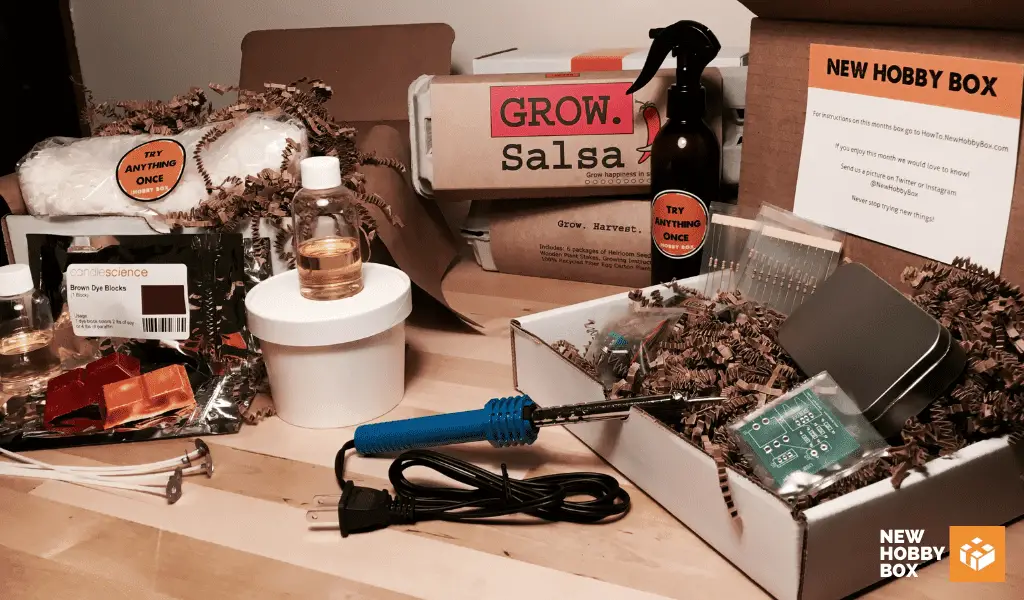
If you’re new to the site, you may not know that New Hobby Box originally began as a subscription box business around 2016. At its very core, New Hobby Box was a hobby turned into a business. That’s because our hobby was trying out new hobbies.
We found a great sense of fulfillment in trying new things, but an even greater sense of purpose in sharing what we learned with others. Naturally, our next step was to create a platform where we could share that with others. And lo and behold a monthly box of new hobbies was our method of doing so.
We went into the project with rose-tinted glasses on. Believing that few things could be more rewarding than turning our hobby into a business that helps others discover amazing things along the way. There’s certainly truth to this, but beyond the romanticized view, in hindsight, there were some real downsides to monetizing our hobby.
Ultimately, this was the reason we decided to shut down the commerce function of New Hobby Box and instead transform it into a hub of content that helps people. In this article, we’re going to share our firsthand experience of the not-so-glamorous side of turning your hobby into a side hustle – including the following 7 reasons why you shouldn’t monetize your hobby:
- Loss of Enjoyment and Passion
- Increased Stress Levels
- Potential for Burnout
- Impact on Relationships
- Financial Instability
- Legal and Tax Implications
- Time Commitment
If there’s an activity that you’re passionate about, and you’re starting to see dollar signs in sharing it with others, then this article is for you. We won’t hold any punches here, and we hope that our experience at least gives you an honest view of what you’re in for, should you decide to pursue monetizing a hobby. To start, we should level set on what a hobby is.

WHAT IS THE VALUE OF A HOBBY?
The value of a hobby lies in personal growth, stress relief, and skill development. Hobbies provide a creative outlet and can foster social connections, enriching our lives beyond work and daily routines.
This is a vastly different concept than a skill. If you don’t know the difference between a skill and a hobby, we recommend checking out our article dedicated to distinguishing the differences. But in short, a skill is an ability that comes naturally or can be learned through repetition, while a hobby is something you do simply for enjoyment. A skill can be a hobby, but not every hobby is a skill. If you’re uncertain whether you’re dealing with a hobby or skill, here are some clear hobby signals:
Fulfills You Personally
Hobbies offer a unique sense of personal fulfillment by allowing individuals to engage in activities they are passionate about. Through the pursuit of hobbies, people can experience a sense of achievement and purpose, leading to a more balanced and satisfying life. Participating in a hobby can provide a deep sense of satisfaction and accomplishment, contributing to overall happiness and self-esteem.
It Relieves Stress
Engaging in hobbies can serve as an effective means of stress relief. Hobbies provide an escape from the pressures of daily life, creating a mental and emotional break from work and personal responsibilities. By focusing on a pleasurable activity, individuals can reduce anxiety, boost their mood, and recharge, making them better equipped to handle life’s challenges.
Fills a Creative Void
Hobbies are an excellent way to explore one’s creativity and develop new skills. Whether it’s learning a musical instrument, mastering a new sport, or exploring the world of painting, hobbies encourage personal growth and intellectual curiosity. As individuals advance in their chosen hobbies, they can experience a sense of pride and accomplishment, enhancing their overall well-being and self-confidence.
Provides Social Connections
Another valuable aspect of hobbies is their potential to foster social connections. Many hobbies provide opportunities to meet like-minded individuals, either through local clubs, online forums, or classes. Building relationships with people who share similar interests can lead to lasting friendships and a sense of belonging, further enriching our lives and contributing to overall happiness.
Why Distinguishing a Skill from a Hobby Matters
At the end of the day, if you’re monetizing something that you’re good at, but you don’t find intrinsic to your identity, losing it will have less of a profound impact on your life. For us, hobbies were an outlet, and as things became so business-focused, they took away from an important escape that we needed in our life. If it had simply been a skill that we were selling, then the grind of running a business wouldn’t have cannibalized a vital component of fulfillment we needed.
In other words, we could still do our hobbies and fill a void, while also running a business.

7 DISADVANTAGES OF TURNING A HOBBY INTO A BUSINESS
We decided to sit down and lay out some of the biggest challenges we faced when we turned our hobby into a business. There are certainly more than the 7 items below, but for us, these were the ones that caught us off-guard, and we wish someone had warned us about them beforehand.
1. Loss of Enjoyment and Passion
When you turn your hobby into a business, the pressure to perform and meet deadlines increases. This added pressure can quickly shift your focus from personal satisfaction to profit. As a result, the very hobby that once brought you joy and relaxation may start to feel like a chore.
One of the clearest examples of this with New Hobby Box was how we had to hit a deadline of shipping out new hobbies every month. It’s challenging to constantly come up with new ideas and source all the products needed, compile, pack, and ship to customers every 30 days or so.
Plus, the need to constantly improve and innovate to stay competitive can also take a toll on your passion. We took a ton of pride in what we were doing as well, so we didn’t want to send out lame kits, which added pressure we didn’t account for.

2. Increased Stress Levels
Maybe you’re a financial wizard or have a solid team with business experience, but if you don’t, you’re in for a world of change. While we had an experienced background in marketing and business, the rapid growth of New Hobby Box with such a lean startup crew immediately spiked our blood pressure.
We went from 15 subscribers in the first month to 1000 subscribers in the 12th month. And yet, we had three people working on the project in their spare time. This meant that we were wearing a lot of different hats. From managing finances to handling customer expectations, it started to feel overwhelming. Procurement of goods was hands down the most challenging and time-consuming responsibility too as the need to consistently produce quality products or services and cater to our customer’s demands was stressful.
Balancing work and personal life becomes even more challenging when your hobby turns into your full-time job. Believe us on that. Juggling the responsibilities of your new venture with your existing commitments can be exhausting and may lead to burnout.
To prevent stress from taking over, it’s important to set boundaries and create a clear distinction between your personal and professional life. Regularly taking breaks, setting realistic goals, and seeking support from friends and family can also help alleviate stress. The biggest hurdle here if you experience the growth we had, is that you’ll be caught in a strange position where you’re growing too big for 1-3 people, but you’re not big enough to hire others to assist you. This is when you’ll have to take on far more responsibilities and your stress levels will rapidly shoot up.
3. Potential for Burnout
When the priority is no longer about having fun and learning new things, but rather about making money, it can significantly alter your relationship with your hobby. We found that in our spare time, the last thing we wanted to do was try out new things. It became more of a chore than a leisurely pursuit.
Burnout not only affects your mental and physical health, but it can also negatively impact your business’s growth. To avoid burnout, it’s crucial to listen to your body and take breaks when needed. Prioritizing self-care and finding ways to recharge will help maintain your passion and enthusiasm for your hobby.
That’s far easier said than done for anyone with an entrepreneurial bone in their body. If that’s you, remember that maintaining a balance between your passion and your new business venture is crucial. It’s essential to remember why you fell in love with your hobby in the first place and make an effort to preserve that initial spark even as you work towards monetizing it. Or at least that would be our advice for someone who’s deadset on monetizing their hobby.
Turning a hobby into a business often means overworking and setting high expectations for yourself. This constant pressure to succeed and outperform competitors can lead to burnout and ultimately diminish your interest in the hobby you once loved.
4. Impact on Relationships
When your hobby becomes your business, it can strain your personal and professional connections. Founded by a husband and wife duo, New Hobby Box could have been another statistic in businesses that break relationships, but thankfully this wasn’t the case for us. However, it did place an incredible strain on our friendships. We found that any time we had traditionally used to foster relationships was now dedicated to building a business.
As you dedicate more time to your new venture, you may find it difficult to maintain the same level of involvement with friends and family. We’d confidently say that you can’t avoid this. You’ll need to make sacrifices somewhere to grow your business, the key here is to sort out where those sacrifices can be made ahead of time.
The other component of this is working with friends or family. While we didn’t have any issues amongst ourselves, things got complicated when we asked for help from friends. Whether it was people not meeting deadlines or just doing a bad job, having tough conversations with people you love is far more difficult than the conversation you would have with an employee outside of personal relationships. If you get help from friends and family, establish clear boundaries and communicate openly to prevent misunderstandings and conflicts.
5. Financial Instability
Starting a business from your hobby often requires an initial investment and comes with unexpected startup costs. No matter how much planning you do, you’re going to have to open the wallet up wider. It’s like Mike Tyson said, “Everyone has a plan until they get punched in the face.”
That’s not to diminish the value of a plan, but it’s simply to state that a plan is rarely a static concept, life happens, and being fluid is a must. As it relates to the costs of starting a business, there are bound to be expenses you couldn’t possibly plan for.
If you’re starting this from a position of low financial stability, you should absolutely begin as lean as possible. Don’t take half your savings and drop them into your idea. Start small and figure out ways where you can use the profit to grow rather than the money you already possess. And whatever you do, don’t quit your day job to pursue this without any sort of proof of concept.
Depending on the nature of your hobby, your income could fluctuate, making it difficult to maintain financial stability. Before turning your hobby into a business, it’s essential to evaluate the potential risks and create a financial plan to ensure you’re prepared for any challenges that may arise.
6. Legal and Tax Implications
By far, the worst part of running a business when it stems from a hobby is navigating legal and tax barriers. Nothing will make you hate a hobby faster than figuring out whether the hobby presents any sort of danger to the recipient or trying to figure out what a sales excise tax means. It’s like government websites are in a foreign language.
But the reality is that you can’t skirt around this. You have to make sure what you’re sharing isn’t harmful to customers and that you’re properly paying the government based on income. Ensuring you have the proper insurance, licenses, and permits in place can be time-consuming and complicated.
The best advice we can give you here is to have legal counsel and a solid accountant and bookkeeper. The peace of mind that each affords you is worth any cost. Seeking professional advice from a lawyer or accountant can help you better understand your legal and tax obligations, preventing potential issues down the road.

7. Time Commitment
Juggling multiple responsibilities and sacrificing personal time is necessary when turning a hobby into a business. Finding the right balance between work and personal life can be challenging and may require you to reprioritize your commitments. This doesn’t work for everyone. If you find that your social time is defining, then turning your hobby into a business simply won’t pan out. Save yourself the unneeded stress and continue doing what you love.
This next part is no small feat, and it’s become so commonplace today that it’s lost all value, but the truth is you need to find a healthy work-life balance to make monetizing your hobby a successful and fulfilling endeavor. This means setting aside dedicated time to rest and relax. Planning your schedule effectively and being mindful of your time commitments will help ensure your hobby-turned-business remains a fulfilling endeavor.

CAN A HOBBY TURN INTO A PROFITABLE BUSINESS?
Yes, a hobby can turn into a profitable business with proper planning, marketing, and dedication. Success depends on factors like demand, competition, and unique selling points. However, it’s important to weigh the pros and cons before monetizing a hobby.
There’s a lot to unpack in this, but assuming you have a real knack for starting a business and marketing it, your first stop should start outside your bubble. In the most rudimentary approach, this is customer demand, the competitive field, and what your unique value proposition will be to potential customers.
Market Demand
Before turning a hobby into a business, start by making sure you’re not the only one who thinks it’s a valuable pursuite. This is about assessing the demand for your potential product or service. Research your target market, head over to a relevant subreddit or Facebook group and ask questions, understand their needs, and determine if there is a genuine interest in what you have to offer.
A sustainable business requires a steady customer base, so ensuring there is sufficient demand is vital for long-term success.
Competitive Landscape
If you don’t know who else is in your space you simply don’t know your space. And that’s a fatal mistake. Analyzing the competition is an essential step in evaluating the feasibility of turning a hobby into a business.
Investigate other companies or individuals offering similar products or services, and determine how your offerings compare. Understanding your competitors’ strengths and weaknesses can help you identify potential gaps in the market and develop strategies to differentiate your business.
Value Proposition
Identifying your unique selling points (USPs) is crucial in setting your business apart from the competition. This helps you define your product or service in a valuable way to your customers but also makes sure that you have a differentiator to hang your hat on.
Determine what makes your product or service unique, and focus on these aspects in your marketing and branding efforts. Your USPs could be related to quality, innovation, customer service, or other differentiating factors that will appeal to your target audience and give your business a competitive edge.
The Major Disadvantages of Turning a Hobby into a Business
When turning a hobby into a business, you’ll face increased competition from others who share the same passion or have already established businesses in the field. To stand out, you’ll need to differentiate your products or services, which can be challenging. Additionally, increased competition may lead to price wars, making it difficult to maintain profitability and market share.
Starting a business comes with inherent risks, and turning a hobby into a business is no exception. There’s always the possibility that your venture may not be as successful as you hoped, leading to financial losses and wasted time and effort. It’s crucial to conduct thorough market research and create a solid business plan to minimize the risks associated with starting a new venture.
When you turn your hobby into a business, the lines between work and personal life can become blurred. We’ve already hit on this, but it bears repeating because it’s so important. It may be challenging to maintain a healthy work-life balance, as your passion now doubles as your livelihood. This can lead to burnout, stress, and a decreased enjoyment of the hobby you once loved. To prevent this, it’s essential to set boundaries and allocate time for relaxation and self-care.
WEIGHING THE PROS AND CONS OF MONETIZING A HOBBY
Monetizing a hobby is a double-edged sword. While it can provide financial benefits and personal fulfillment, it also comes with its fair share of challenges, such as increased competition, risk of failure, and difficulty separating work and personal life.
Before taking the plunge to turn your hobby into a business, hopefully, it’s clear now that you need to carefully weigh the pros and cons, considering your personal goals, values, and the level of commitment required.
It’s also important to remember the value of hobbies for personal growth and enjoyment. Hobbies can be a great way to relieve stress, explore new interests, and develop new skills. When monetizing a hobby, there’s a risk of losing sight of these benefits, as the focus shifts from personal satisfaction to profit.
The moment we stopped making New Hobby Box about growing a traditional business and instead focused on making great content at our own pace, we immediately felt passionate about learning new things again. This was when we got back to our roots and focused on keeping three hobbies in our lives at all times, which is the magic number of hobbies that everyone should have at any given time.
Now, this doesn’t mean that you should never monetize your hobby. The point of this article was to make you aware of the friction that can come from business aspirations mingling with personal enjoyment. In our minds and experience, personal enjoyment should trump monetary gains.
In the end, the decision to monetize a hobby is a deeply personal one – be sure to account for your motivations, the viability of your idea, and the potential impact on your quality of life. If you decide to pursue your hobby as a business, remember to nurture your passion, maintain a healthy work-life balance, and never lose sight of the joy and personal growth that your hobby brings.
